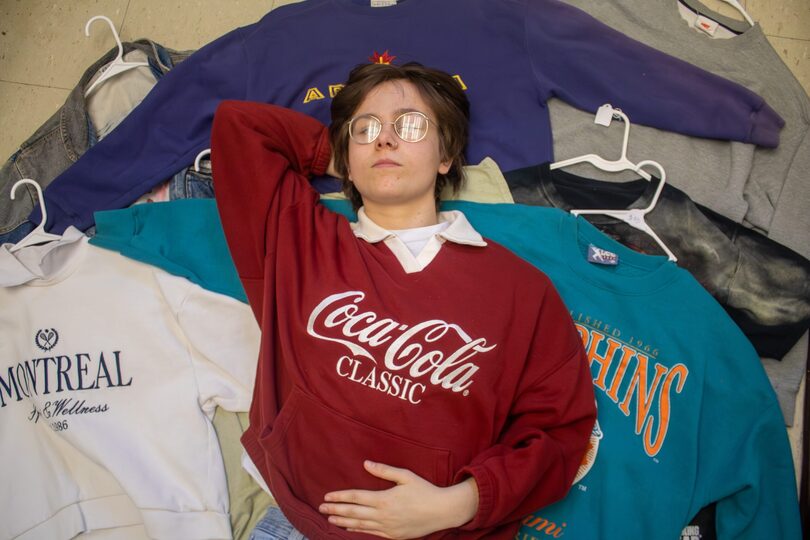Rolling thrift store: Revamped is a mobile solution to campus clothing waste

Ava Lubkemann began thinking about Revamped, her mobile thrift store, when she attended the Invent@SU program through Syracuse University’s College of Engineering and Computer Science. Now, Revamped hosts pop-up shops on campus and collaborates with student fashion designers by selling scraps of fabric for a lower cost. Leonardo Eriman | Asst. Video Editor
Get the latest Syracuse news delivered right to your inbox.
Subscribe to our newsletter here.
Having grown up in secondhand culture, sustainability shaped Ava Lubkemann’s lifestyle from an early age. Her passion for thrifting and awareness of clothing waste on college campuses led her to start Revamped, an affordable thrift store on wheels.
“Everyone thinks they have a solution for the waste problem. I’ve met so many different organizations that have tried; they don’t think through it and they compete with everyone else,” Lubkemann, a SU sophomore studying environmental engineering, said. “It’s not a competition at the end of the day, you’ve got to work together, take inspiration from what other people have done and make it your own.”
Lubkemann’s ultimate plan for Revamped is to renovate an old bus and turn it into a thrift store and donation center. This way, the Syracuse University student body and local community will have an efficient way to shop secondhand and contribute to sustainability efforts.
Currently, Revamped hosts pop-up shops on campus and collaborates with student fashion designers by selling scraps of fabric for a lower cost. This lessens the financial burden on student designers while also making fashion more holistically sustainable, Lubkemann said.
“We’ve integrated more on how to not only bring students a mobile thrift store and donation center for affordable clothes, but also benefit the community and use this mapping of textile waste distribution as a way to map economic disparity,” she said.
Lubkemann initially began thinking about Revamped when she attended the Invent@SU program through the College of Engineering and Computer Science. There, she learned how to intersect engineering and business through writing and pitching business plans.
Through the program, she learned the basics of entrepreneurship while furthering her knowledge of engineering. When she wasn’t in class, she was dumpster diving around campus. This was something she had grown up hearing about, but never had the chance to do back at home.
While doing this, her father encouraged her to conduct an initial study on the clothing she sourced to find out its value. She tracked how much waste had accumulated since students moved out of the dorms for the summer last year. What she found was approximately $3,000 worth of textile waste over a six-week period.
This finding led Lubkemann to write up a mock business plan for Revamped last summer.
“We don’t have any real systems in place, especially for year-round distribution of waste,” Lubkemann said. “Textiles tend to fall through the cracks, and we live in a society that has such an overconsumptive culture, specifically surrounding fashion.”

When Ava Lubkemann realized the lack of donation centers and thrift stores in close proximity to Syracuse University was causing students to throw away their goods, she created Revamped, her thrift store on wheels. She hopes that the business’ mission shows students they have the power to respond to issues around them. Flynn Ledoux | Illustration Editor
Revamped has officially been in business since winning its first $5,000 last fall at a competition run by Innovate Orange and Bird Library. The business won $5,000 at the Panasci Business Plan Competition and $2,000 through the Hunter Brooks Watson Entrepreneurship Award this month.
Most recently, Lubkemann secured a $7,500 grant through the SOURCE at SU for the Revamped Research Initiative, which is the qualitative basis she started that studies textile waste distribution. Revamped has raised around $20,000 to date, which goes into sourcing and distributing clothing, and also researching solutions to clothing waste on college campuses.
Lubkemann met one of her mentors, Linda Dickerson Hartsock, at Invent@SU. Hartsock is the founder of the Blackstone LaunchPad at SU and has since begun running Innovate Orange, a program that helps faculty, staff and students turn research ideas into businesses. When the fall 2024 semester started, Lubkemann became an Orange Innovation Scholar and Hartsock encouraged her to pitch the Revamped business plan in competitions.
Hartsock introduced Lubkemann to another important mentor along the way. Erin Miller was a graduate of the Blackstone LaunchPad, and started a video production company out of a renovated bus, similar to Revamped. Connecting with somebody from the same program mentor and an up-and-coming entrepreneur was a full circle moment that showed how impactful campus innovation hubs are, Hartsock said.
“Mentorship is huge, especially as a student, you have elders at your disposal around you,” Miller said. “They have to help you, and that is an invaluable resource.”
Revamped was created to not only give students a mobile way to find and donate affordable clothing, but also to address a larger issue.
Over the summer, Lubkemann was dumpster diving on South Campus when she was stopped by the Department of Public Safety. After checking her SUID, they let her go, but shared that they’d previously confiscated and thrown away the items of another man doing the same exact thing as her.
She realized that her status as a student gave her the privilege to access the waste, while somebody who wasn’t a student may have needed it more, but was denied access. This issue was a larger factor that Lubkemann wanted to address.
“It got me thinking about how only students can have access to student waste, but we’re the problem,” Lubkemann said.
Syracuse is the eighth most impoverished city in the United States. When looking at net gross income rates across the city, SU students are in a bubble, as their median family income rates are significantly higher than the surrounding areas in the city, Lubkemann noted.
While dumpster diving, she found several name-brand items in perfect condition. Through observing the behavior of her peers, Lubkemann realized the lack of donation centers and thrift stores in close proximity to SU led students to throw away their goods. The clothing she found could go to the homeless population of the city, Lubkemann said.
“An aspect I focused on was this interesting intersection between environmental justice and social justice that I experienced firsthand,” Lubkemann said.

Lily Zuckerman | Design Editor
When thinking about the target audience of Revamped on campus, Lubkemann also stressed the importance of representing different styles and trends. She and her creative director, sophomore television, radio and film major Isabella Carter, wanted to showcase various aesthetics through the clothes they sold. They also work with other organizations on campus, like Sapphic Magazine, so the clothing they source is modeled in the magazine issues, Carter said.
“We really target styles that are in,” Lubkemann said. “We can do anything from cottage core to professional. We kind of mold our stuff in any way.”
Revamped wouldn’t be possible without the community at SU that encourages student entrepreneurship, Carter said. Programs like the Blackstone LaunchPad and Innovate Orange help students gain skills they’ll apply in their personal and professional lives, Hartsock said. Not only do students channel the knowledge they already have, they can also connect with peers of differing passions.
“You put together this small group of engineers, business majors, marketing majors, content creators at VPA or Newhouse, and they work together collaboratively,” Hartsock said. “And when that happens, magic happens.”
College students have the room to grow, learn and take risks, address the larger issues that Gen Z faces and learn from those before them, Hartsock said. Initiatives on campus can act as a third space for students to collaborate, change mindsets and build on ideas, Miller said.
Lubkemann and everyone involved with Revamped hope that the business’ mission resonates with the SU community, showing students they have the power to respond to issues around them.
“I hope that on campus, people can continue to look at what I’ve done, and use it as a roadmap of sorts to what can happen with just a little belief,” Lubkemann said.






